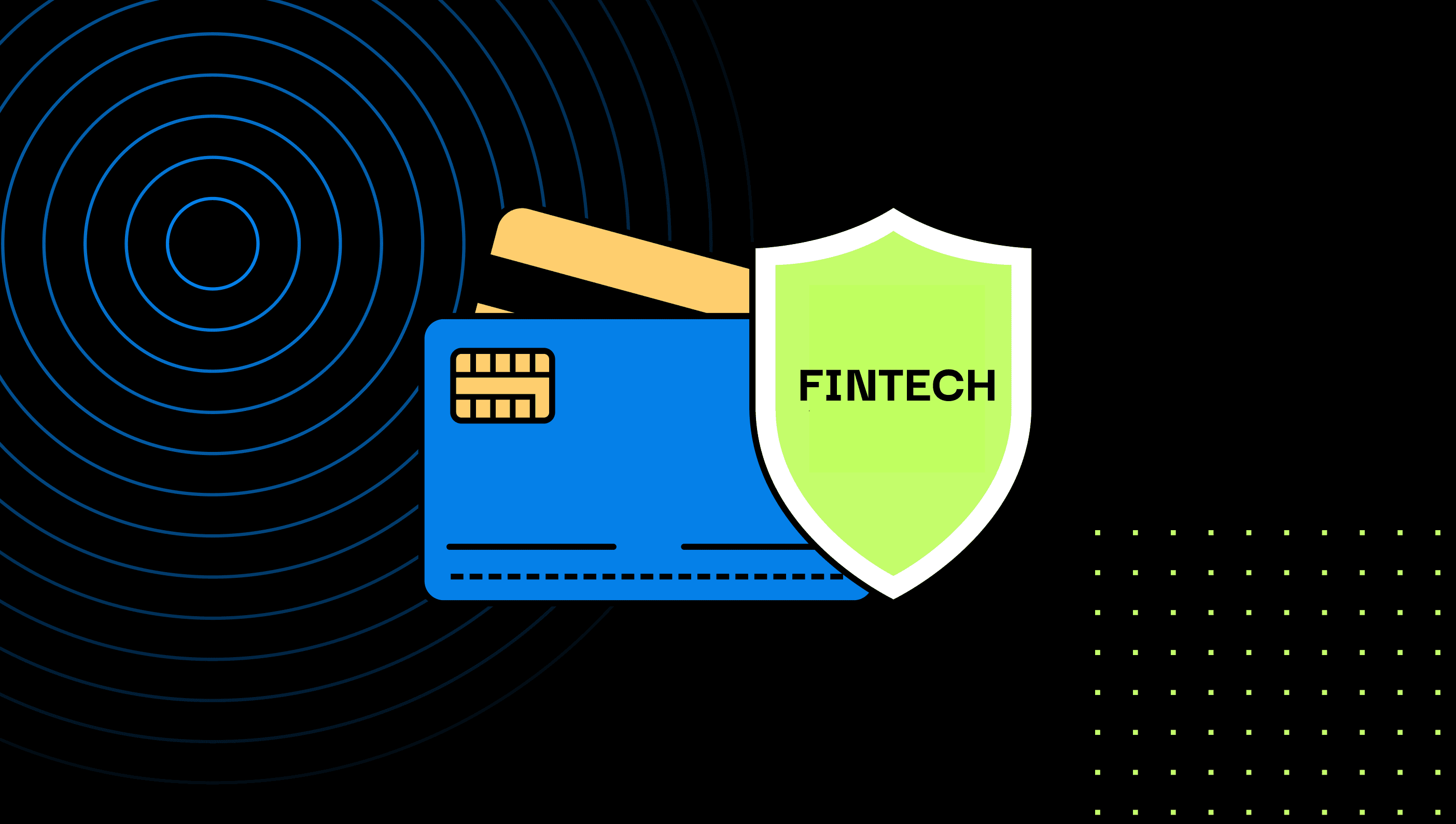What is Fintech Compliance? A Guide to Risks and Regulations
Discover how to build a resilient fintech compliance program in our guide covering risks, regulations, and practical implementation strategies.
Fintech has brought a refreshing breath of innovation to the traditionally conservative finance industry. From digital-first business models to more accessible cloud applications, fintech has made banks and other financial institutions more efficient while giving consumers convenient new services.
But those benefits come with risks—not least to fintech companies themselves.
Many offer services that, while not directly regulated, serve heavily regulated financial institutions. Others operate in gray areas where regulators have been slow to enter, but they are paying closer attention to risk in the fintech industry.
Whether due to direct regulation or closer scrutiny from customers, compliance is becoming a critical objective for fintech businesses worldwide.
This article will introduce the major risks fintech firms will need to address through improved compliance programs.
What is Fintech Compliance?
From cloud-based, mobile-first payment services to innovative blockchain applications, financial technologies (fintech) play several roles in today’s financial industries.
Innovators: Fintech companies leverage the tech industry’s innovation engine to bring new services to market faster than traditional firms.
Disruptors: Rapidly-iterating technology companies disrupt established competitors by offering more convenient and efficient services or reaching untapped markets.
Partners: Financial firms routinely outsource back-end functions to fintech companies that natively understand cloud, mobile, and machine learning technologies.
These companies share the standard risks that any business faces, from cash flow to credit. At the same time, fintech companies must address unique risks created by the nature of their industry.
Compliance mitigates these risks.
Some companies have no choice. New regulations will demand compliance. Or the financial institutions they serve will require it to support their own compliance programs.
Other companies will choose a voluntary compliance journey. Farsighted fintech leaders understand that reassuring institutional or retail customers through compliance creates a competitive advantage.
No matter where the pressure for compliance comes from, fintech companies must address a host of risks.
4 Major Risks in Fintech
Fintech companies face unique risks in four primary areas: regulation, cybersecurity, financial and business, and reputation.
1. Fintech Regulatory Risk
Unlike their traditional counterparts, fintech companies operate in a more fragmented and uncertain regulatory environment. So much so that 47% of fintechs point to unfavorable regulatory environments as one of the main factors hindering their ability to grow. Meanwhile, 93% say it’s at least somewhat challenging to meet compliance requirements
In some ways, federal regulators in the US were slow to regulate the fintech industry. At first, this was due to the lack of institutional expertise in emerging technologies. They were also reluctant to impose regulations that could throttle a young industry.
In other ways, federal regulators have aggressively pursued fintech companies. The Securities and Exchange Commission (FTC) is particularly active against crypto companies that cross the line between asset classes and securities.
Some state regulators were more proactive. New York’s Department of Financial Services introduced regulations covering cryptocurrencies and crypto exchanges. California’s Consumer Financial Protection Law brought new financial service providers under state oversight.
Without unifying federal regulation, state-by-state variation creates more risk for companies delivering nationwide services.
The same is true globally. Different countries have different regulatory priorities. Preserving innovation may be important in the US, for example, but protecting consumer privacy takes precedence in the EU.
Fintech companies must navigate this complex regulatory environment and anticipate change to minimize their regulatory risk exposure.
2. Fintech Cybersecurity Risk
Cybersecurity is a challenge every business must meet. For the fintech industry, cyber risks are more severe. Breaches could disrupt institutional customers’ operations or compromise retail customers’ finances (for example, the targeted attack that compromised the personal data of more than 50,000 Revolut consumers).
Either case is traumatic and could end a young fintech company’s existence.
The closer a company is to the country’s financial infrastructure, the greater the threat from state-sponsored advanced persistent threats.
Fintech companies that store consumer financial data become targets for organized cyber criminals. Even unsophisticated hackers can launch devastating attacks thanks to malware-as-a-service providers.
Complicating matters, fast-growing fintech startups have less time, experience, or resources to secure their infrastructure. Hardware and software vulnerabilities can appear at any time. Social engineering can breach defenses with a simple click on a link.
As software innovators, fintech companies are particularly vulnerable to third-party and supply chain risks. Cloud computing and X-as-a-Service providers let startups piece together enterprise-grade operations. Fintech developers rely on repositories of third-party code to simplify and shorten project lifecycles, exposing their software to supply chain attacks.
These third-party relationships can create significant risk.
A fintech company’s cybersecurity is entangled with its service providers’ security practices. Without careful controls, code dependencies can open attack vectors into a fintech company’s systems—and allow hackers into its customers’ systems.
Compliance with SOC 2 and other cyber risk management frameworks can make fintech companies—and their customers—more secure.
3. Fintech Financial and Business Risk
With proper funding, early-stage technology companies are agile and risk-tolerant. They quickly bring advanced technologies to market, pivot to seize new opportunities, and rapidly iterate in response to customer demand.
A fintech company’s greatest strength is also a significant source of risk.
Operational Risks
The problem with moving fast and breaking things is that you break things.
That might be fine in social media, but not when you handle credit card data or process a bank’s transactions. Fintech companies must balance innovation against operational risks.
Technology Risks
At the same time, fintech depends on technology-driven business models with inherent risks. For example, artificial intelligence and machine learning algorithms can amplify the prejudices built into training data sets.
Consumer Risks
Fintech scales quickly by making sophisticated financial services more accessible to a broader range of consumers. However, selling to more people means selling to more financially naive people.
Consumers who do not understand a financial service and its risks can get burned even if a fintech company does nothing wrong.
If something does go wrong, impacting thousands of consumers, a fintech company could face a business-ending backlash.
Investor Risks
Venture capital funds and other tech investors willingly place long-term bets that fund fintech innovation.
That model works well as long as investor optimism remains strong.
Recession, geopolitical uncertainty, and other factors can undermine that optimism. As VC firms become pickier about their investments, fintech companies could lose the funding they need to survive.
4. Fintech Reputational Risk
The whole point of financial regulation is to preserve confidence in the financial industry. For all the technological innovation fintech brings to market, reputation still matters.
A significant cyber incident or the collapse of a funding round will damage a fintech company’s reputation. Consumers will flee to more reliable competitors. Banks will question the value of the firm’s services.
Companies that manage their business well can still suffer from the mistakes of their competitors. For example, failed crypto exchanges create distrust in companies building blockchain solutions.
Compliance programs that keep other risks under control go a long way toward avoiding these reputational risks.
Who Regulates Fintech Companies?
As we discussed above, the regulatory environment for fintech is a patchwork of overlapping authorities, each with its own priorities and rules. Despite the complexity, having a base understanding of the main players can help fintechs navigate compliance on a global scale.
Below is a closer look at the main regulatory bodies shaping the industry across different regions.
United States
Fintech companies in the U.S. operate under several regulatory agencies, depending on their specific services and jurisdictions. Notable regulators include:
The Consumer Financial Protection Bureau (CFPB), a U.S. government agency that implements and enforces federal consumer financial law and ensures that consumer financial product markets are fair, transparent, and competitive.
The Federal Deposit Insurance Corporation (FDIC), an independent agency created by the U.S. Congress. It insures deposits and examines financial institutions (including fintechs) for safety, soundness, and consumer protection.
The Securities and Exchange Commission (SEC), founded to help the U.S. respond to the Great Depression. It regulates securities trading and investment activities.
The Financial Crimes Enforcement Network (FinCEN), a bureau of the U.S. Department of the Treasury that oversees anti-money laundering (AML) and counter-terrorism financing (CTF) compliance.
The Federal Trade Commission (FTC), which protects consumers by preventing anticompetitive, deceptive, and unfair business practices.
United Kingdom
There are two main regulatory bodies overseeing fintech regulation in the United Kingdom. While they’re both part of the Bank of England and work together on certain issues, they are separate entities:
The Financial Conduct Authority (FCA), an independent public body, ensures financial markets comply with financial regulations and consumer protection laws.
The Prudential Regulation Authority (PRA) supervises around 1,500 financial institutions. It creates policies for these firms and ensures that financial services and products can be provided safely.
Europe
The European regulatory landscape combines oversight from EU-wide institutions with the specific priorities of national regulators. The top players in fintech regulation include:
The European Central Bank (ECB), which supervises fintechs in the same way as traditional banks. To this end, it has the authority to conduct supervisory reviews, on-site inspections and investigations, grant or withdraw banking licenses, ensure compliance with EU prudential rules, and oversee financial stability and GDPR compliance.
The European Banking Authority (EBA), which develops guidelines for consistent prudential regulation across the EU and assesses risks and vulnerabilities in the EU banking sector.
The European Securities and Markets Authority (ESMA), the EU’s financial markets regulator and supervisor. Its official role is to improve investor protection and promote stable, orderly financial markets.
Canada
Canadian fintech companies operate under the oversight of:
The Office of the Superintendent of Financial Institutions (OSFI), which supervises federally regulated financial institutions and pension plans. It regularly reviews those institutions and issues review letters that may require or recommend improvements.
The Financial Transactions and Reports Analysis Centre of Canada (FINTRAC), which reports to the Ministry of Finance and facilitates the detection, prevention, and deterrence of money laundering and the financing of terrorist activities.
The Financial Consumer Agency of Canada (FCAC), that protects and informs consumers about financial products and services. It’s responsible for oversight of compliance with certain voluntary codes of conduct and has, among other things, the authority to direct banks to undergo a third-party audit to comply with legal obligations.
Asia-Pacific (APAC) Region
The Asia-Pacific region is home to the highest-growing fintech industry in the world. Some of the most notable regulatory bodies here include:
The Australian Securities and Investments Commission (ASIC), an independent Australian government body overseeing corporate governance and consumer protection in financial services.
The Australian Prudential Regulation Authority (APRA), which supervises financial institutions to ensure financial stability.
The Australian Transaction Reports and Analysis Centre (AUSTRAC), Australia’s anti-money laundering and counter-terrorism financing regulator. It works to prevent criminal abuse of the financial system.
The Office of the Australian Information Commissioner (OAIC), which upholds and promotes privacy rights, information access, and data protection. It’s an independent national regulator handling complaints and providing advice on privacy best practices to assist organizations in meeting legal compliance obligations.
The Monetary Authority of Singapore (MAS), Singapore’s central bank. It has introduced initiatives such as the FinTech Regulatory Sandbox, that enables startups to experiment with innovative solutions under regulatory oversight.
Reserve Bank of India (RBI), India’s central bank. It regulates fintech and digital payment systems and includes guidelines for digital wallets, payment systems, and peer-to-peer lending platforms.
The Japan Financial Services Agency (JFSA), which monitors and oversees financial institutions to verify compliance with regulations and fiscal stability. It also implements measures to detect and prevent money laundering operations.
The National Financial Regulatory Administration (NFRA), which maintains oversight and enforces financial regulations across most sectors of the financial industry in China (securities are the only major exception).
The Financial Services Commission (FSC) of South Korea, which regulates the nation’s financial sector. It’s responsible for formulating financial policies, supervising financial institutions and financial markets, and protecting consumers.
What Regulations Do Fintech Companies Face?
Fintech companies have to navigate a maze of regulations that address a wide range of risks and challenges.
Below, we outline some of the most prominent regulatory requirements, what they entail, and where they apply. This is not an exhaustive list, but highlights some of the most relevant frameworks shaping the industry today.
Anti-Money Laundering (AML) and Counter-Terrorism Financing (CTF)
AML and CTF regulations require organizations to implement measures like customer due diligence, transaction monitoring, and suspicious activity reporting. For fintech companies, compliance often involves deploying advanced analytics to detect and report potential risks in real-time.
These regulations are enforced globally, and anchored by the Financial Action Task Force (FATF), which sets international standards for combatting financial crime.
National-level regulations, such as the U.S. Bank Secrecy Act and the EU’s 6th Anti-Money Laundering Directive (6AMLD), further outline specific requirements to address money laundering and terrorism financing within their jurisdictions.
Payment Card Industry Data Security Standard (PCI DSS)
PCI DSS is a global security standard designed to protect payment card information during transactions. It outlines specific requirements for organizations that handle cardholder data, including encryption, access control, and regular security testing.
Compliance ensures that sensitive payment information is safeguarded against breaches and fraud. The PCI standard outlines 12 requirements for achieving compliance.
Gramm-Leach-Bliley Act (GLBA)
The Gramm-Leach-Bliley Act (GLBA) is a U.S. federal law that governs how financial institutions handle nonpublic personal information (NPI). It mandates that they provide clear privacy notices to consumers, explaining how their data is collected, used, and shared.
The GLBA also requires institutions to implement safeguards that protect sensitive customer information from unauthorized access or breaches. Fintech companies that process or store financial data are subject to these rules, particularly if they interact with consumer accounts or offer services such as loans or investment products.
Health Insurance Portability and Accountability Act (HIPAA)
The Health Insurance Portability and Accountability Act (HIPAA) is a U.S. federal law designed to protect sensitive health information from being disclosed without the patient's consent or knowledge.
For fintech companies involved in healthtech or handling healthcare payments, HIPAA mandates strict compliance with privacy and security rules. These include safeguarding electronic health information, conducting regular risk assessments, and implementing administrative, physical, and technical safeguards.
Sarbanes-Oxley Act (SOX)
The Sarbanes-Oxley Act (SOX) is a U.S. federal law enacted to enhance corporate accountability and financial transparency following the high-profile Enron scandal.
SOX imposes rigorous requirements on public companies, including fintech firms that are publicly traded, to improve the accuracy of financial disclosures and prevent fraud. Provisions include internal control assessments, independent auditing of financial records, and CEO and CFO certification of financial statements.
While SOX primarily applies to U.S.-listed companies, its influence extends globally, as international firms listed on U.S. exchanges must also comply with its provisions.
California Consumer Privacy Act (CCPA)
The California Consumer Privacy Act (CCPA) grants California residents specific rights over their personal data, including the right to know what data is being collected, the ability to request deletion of personal information, and the option to opt out of data sales.
It applies to businesses that collect personal data and meet certain thresholds, such as annual revenue exceeding $25 million or handling data of more than 100,000 California residents, households, and devices.
Fintech companies that operate in California or serve its residents must ensure data privacy measures, transparency in data handling practices, and compliance with consumer requests under CCPA.
General Data Protection Regulation (GDPR)
The General Data Protection Regulation (GDPR) is a data protection law enacted by the European Union to enhance individuals' privacy rights and impose strict requirements on organizations that handle personal data.
Key provisions include the right to access, correct, and delete personal information, as well as strict requirements for data breach notifications. The GDPR applies to any organization processing data of EU residents, regardless of where the company is based.
For fintech companies, compliance often entails implementing rigorous data governance frameworks, appointing Data Protection Officers (DPOs), and conducting regular Data Protection Impact Assessments (DPIAs). Noncompliance can result in steep fines, reaching up to 4% of global annual revenue or €20 million, whichever is higher.
Fair Credit Reporting Act (FCRA)
The Fair Credit Reporting Act (FCRA) is a U.S. federal law designed to ensure the accuracy, fairness, and privacy of consumer information contained in credit reports. It regulates how consumer reporting agencies collect, use, and share credit information.
Fintech companies that perform credit checks or interact with consumer credit data must comply with FCRA requirements, including obtaining proper consumer consent and providing adverse action notices when necessary. The law also grants consumers the right to dispute inaccuracies in their credit reports.
The Truth in Lending Act (TILA)
Another U.S. federal law, the Truth in Lending Act (TILA) aims to promote transparency in consumer credit transactions. It requires lenders, including fintech companies offering credit services, to clearly disclose key terms and costs of loans and credit agreements.
These disclosures include the annual percentage rate (APR), finance charges, and the total cost of the credit over its term. TILA also provides consumers with a few protections, such as the right to cancel loans within three days.
How to Build a Resilient Fintech Compliance Strategy
Convoluted as fintech regulations might be, compliance with said regulations is still your first line of defense against the risks we’ve discussed.
Even in this challenging regulatory landscape, there are practical strategies you can use to improve your compliance program, safeguard your reputation, and maintain customer trust.
Understand What Compliance Means for Your Organization
Start with the basics. Rather than attempting to comply with every regulation in existence, take time to figure out which regulations actually apply to your business.
For instance, a lending platform's compliance priorities revolve around fair lending regulations, while payment processors focus heavily on PCI DSS requirements and transaction monitoring. Operating in California brings CCPA compliance into focus, while handling EU resident data calls for GDPR controls.
Future plans deserve equal attention in compliance planning. New markets, new products, and new partnerships each bring fresh regulatory considerations. If you’re eyeing international expansion, you need to build compliance capabilities well before entering those markets. If you’re considering new financial products, you need to understand how they affect your compliance obligations.
Careful consideration of your company's unique profile prevents wasted effort on regulations that don't even apply to your operations.
Outsource Your Compliance Needs
Not every fintech company needs a full-time compliance team from day one. In fact, there are plenty of compliance solutions that offer specialized expertise without the overhead of building an internal department. You can look into:
Compliance automation tools that handle the heavy lifting of day-to-day compliance operations. Transaction monitoring systems can flag suspicious patterns automatically, identity verification services can handle KYC requirements, and automated reporting tools can generate the documentation required by regulators.
Professional service firms, such as law firms specializing in fintech, can guide your regulatory strategy and handle complex compliance questions. Accounting firms can provide audit support and help prepare for regulatory examinations, while cybersecurity consultants are equipped to test your defenses and recommend improvements.
Look for providers with experience in your particular segment of fintech and the jurisdictions where you operate. Check their track record with similar companies and their ability to scale as your compliance needs evolve.
Build a Compliance-Centric Culture
Rules and systems matter, but they're not enough on their own. The best compliance programs take root in company cultures where everyone understands their role in keeping the business secure and compliant.
But what does this look like in practice?
In broad strokes, compliance becomes part of everyday conversation and decision-making. Developers debate privacy implications during feature planning. Customer service teams understand how their customer interactions affect regulatory obligations. Product managers know which regulations might impact their roadmaps before they finalize any plans. And so on.
What’s more, strong compliance cultures encourage teams to raise red flags early and often. Execs and department heads hear these complaints, and turn mishaps into learning opportunities rather than witch hunts.
Yes, building this kind of culture takes time and persistence. But in an industry where trust means everything (and with fintech handling people's money, it absolutely does), a compliance-first culture pays dividends far beyond just staying out of trouble with regulators.
Compliance-Centric Fintech Companies Bring Risks Under Control
Risk management is part of any business. Fintech companies operate in more dynamic conditions that create unique risks.
For the fintech industry, compliance is essential to bringing these risks under control.
An effective compliance control does more than help the company follow regulations. Demonstrating compliance reassures business and retail customers and gives fintech companies a competitive advantage.
Book a demo with our team today, and see how Drata can help you achieve continuous compliance.






